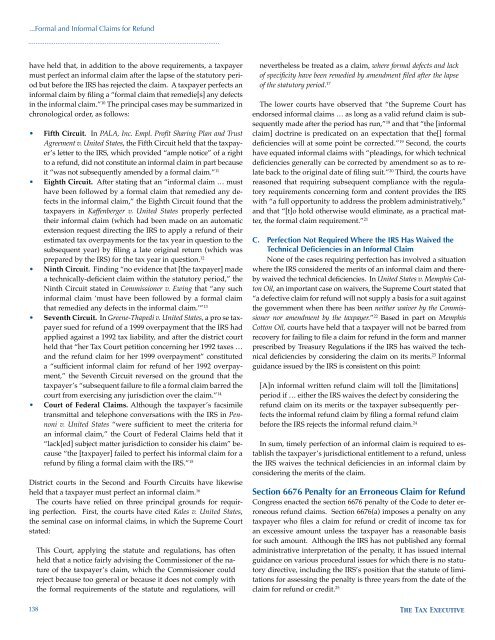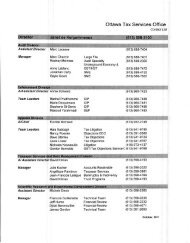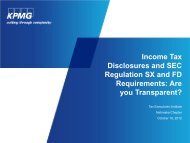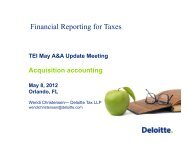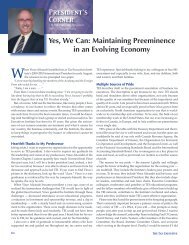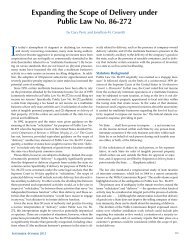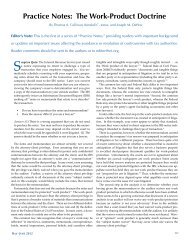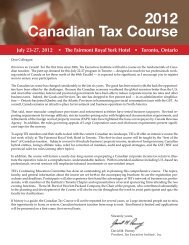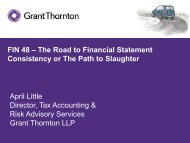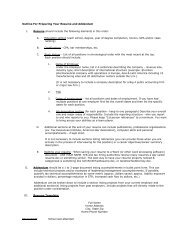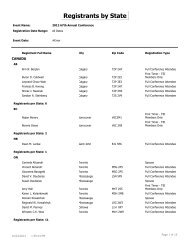recent Developments to Consider when Filing Formal and Informal ...
recent Developments to Consider when Filing Formal and Informal ...
recent Developments to Consider when Filing Formal and Informal ...
Create successful ePaper yourself
Turn your PDF publications into a flip-book with our unique Google optimized e-Paper software.
...<strong>Formal</strong> <strong>and</strong> <strong>Informal</strong> Claims for Refundhave held that, in addition <strong>to</strong> the above requirements, a taxpayermust perfect an informal claim after the lapse of the statu<strong>to</strong>ry periodbut before the IRS has rejected the claim. A taxpayer perfects aninformal claim by filing a “formal claim that remedie[s] any defectsin the informal claim.” 10 The principal cases may be summarized inchronological order, as follows:• Fifth Circuit. In PALA, Inc. Empl. Profit Sharing Plan <strong>and</strong> TrustAgreement v. United States, the Fifth Circuit held that the taxpayer’sletter <strong>to</strong> the IRS, which provided “ample notice” of a right<strong>to</strong> a refund, did not constitute an informal claim in part becauseit “was not subsequently amended by a formal claim.” 11• Eighth Circuit. After stating that an “informal claim … musthave been followed by a formal claim that remedied any defectsin the informal claim,” the Eighth Circuit found that thetaxpayers in Kaffenberger v. United States properly perfectedtheir informal claim (which had been made on an au<strong>to</strong>maticextension request directing the IRS <strong>to</strong> apply a refund of theirestimated tax overpayments for the tax year in question <strong>to</strong> thesubsequent year) by filing a late original return (which wasprepared by the IRS) for the tax year in question. 12• Ninth Circuit. Finding “no evidence that [the taxpayer] madea technically-deficient claim within the statu<strong>to</strong>ry period,” theNinth Circuit stated in Commissioner v. Ewing that “any suchinformal claim ‘must have been followed by a formal claimthat remedied any defects in the informal claim.’” 13• Seventh Circuit. In Greene-Thapedi v. United States, a pro se taxpayersued for refund of a 1999 overpayment that the IRS hadapplied against a 1992 tax liability, <strong>and</strong> after the district courtheld that “her Tax Court petition concerning her 1992 taxes …<strong>and</strong> the refund claim for her 1999 overpayment” constituteda “sufficient informal claim for refund of her 1992 overpayment,”the Seventh Circuit reversed on the ground that thetaxpayer’s “subsequent failure <strong>to</strong> file a formal claim barred thecourt from exercising any jurisdiction over the claim.” 14• Court of Federal Claims. Although the taxpayer’s facsimiletransmittal <strong>and</strong> telephone conversations with the IRS in Pennoniv. United States “were sufficient <strong>to</strong> meet the criteria foran informal claim,” the Court of Federal Claims held that it“lack[ed] subject matter jurisdiction <strong>to</strong> consider his claim” because“the [taxpayer] failed <strong>to</strong> perfect his informal claim for arefund by filing a formal claim with the IRS.” 15District courts in the Second <strong>and</strong> Fourth Circuits have likewiseheld that a taxpayer must perfect an informal claim. 16The courts have relied on three principal grounds for requiringperfection. First, the courts have cited Kales v. United States,the seminal case on informal claims, in which the Supreme Courtstated:This Court, applying the statute <strong>and</strong> regulations, has oftenheld that a notice fairly advising the Commissioner of the natureof the taxpayer’s claim, which the Commissioner couldreject because <strong>to</strong>o general or because it does not comply withthe formal requirements of the statute <strong>and</strong> regulations, willnevertheless be treated as a claim, where formal defects <strong>and</strong> lackof specificity have been remedied by amendment filed after the lapseof the statu<strong>to</strong>ry period. 17The lower courts have observed that “the Supreme Court hasendorsed informal claims … as long as a valid refund claim is subsequentlymade after the period has run,” 18 <strong>and</strong> that “the [informalclaim] doctrine is predicated on an expectation that the[] formaldeficiencies will at some point be corrected.” 19 Second, the courtshave equated informal claims with “pleadings, for which technicaldeficiencies generally can be corrected by amendment so as <strong>to</strong> relateback <strong>to</strong> the original date of filing suit.” 20 Third, the courts havereasoned that requiring subsequent compliance with the regula<strong>to</strong>ryrequirements concerning form <strong>and</strong> content provides the IRSwith “a full opportunity <strong>to</strong> address the problem administratively,”<strong>and</strong> that “[t]o hold otherwise would eliminate, as a practical matter,the formal claim requirement.” 21C. Perfection Not Required Where the IRS Has Waived theTechnical Deficiencies in an <strong>Informal</strong> ClaimNone of the cases requiring perfection has involved a situationwhere the IRS considered the merits of an informal claim <strong>and</strong> therebywaived the technical deficiencies. In United States v. Memphis Cot<strong>to</strong>nOil, an important case on waivers, the Supreme Court stated that“a defective claim for refund will not supply a basis for a suit againstthe government <strong>when</strong> there has been neither waiver by the Commissionernor amendment by the taxpayer.” 22 Based in part on MemphisCot<strong>to</strong>n Oil, courts have held that a taxpayer will not be barred fromrecovery for failing <strong>to</strong> file a claim for refund in the form <strong>and</strong> mannerprescribed by Treasury Regulations if the IRS has waived the technicaldeficiencies by considering the claim on its merits. 23 <strong>Informal</strong>guidance issued by the IRS is consistent on this point:[A]n informal written refund claim will <strong>to</strong>ll the [limitations]period if … either the IRS waives the defect by considering therefund claim on its merits or the taxpayer subsequently perfectsthe informal refund claim by filing a formal refund claimbefore the IRS rejects the informal refund claim. 24In sum, timely perfection of an informal claim is required <strong>to</strong> establishthe taxpayer’s jurisdictional entitlement <strong>to</strong> a refund, unlessthe IRS waives the technical deficiencies in an informal claim byconsidering the merits of the claim.Section 6676 Penalty for an Erroneous Claim for RefundCongress enacted the section 6676 penalty of the Code <strong>to</strong> deter erroneousrefund claims. Section 6676(a) imposes a penalty on anytaxpayer who files a claim for refund or credit of income tax foran excessive amount unless the taxpayer has a reasonable basisfor such amount. Although the IRS has not published any formaladministrative interpretation of the penalty, it has issued internalguidance on various procedural issues for which there is no statu<strong>to</strong>rydirective, including the IRS’s position that the statute of limitationsfor assessing the penalty is three years from the date of theclaim for refund or credit. 25138The Tax Executive


